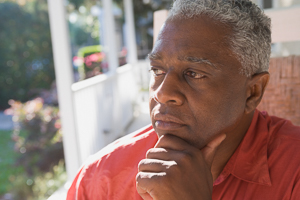Dealing With Anxiety After a Loss
Overview

Worry and anxiety can develop after a major loss. Anxiety is a general feeling of tenseness or uneasiness. You may feel generally anxious (called free-floating anxiety). Anxiety can cause physical symptoms, such as an upset stomach or a headache. Anxiety can also cause you to act in ways that are unusual for you, such as being more demanding, less patient, or more irritable.
Worries and anxiety can sometimes seem to take over your life, making you feel like everything is falling apart at the same time. You may need to slow down and take things one at a time. If you are feeling overwhelmed, ask for help from someone you trust, your doctor, or a counselor.
Managing anxiety after a loss
Here are some things you can do to help manage your worry and anxiety after a loss.
- Express your feelings.
Talk or write about the things that are bothering you. Even if you are not sure what is bothering you, finding words for your feelings often helps you figure out what is causing your anxiety.
- Take charge.
Making plans to deal with your day-to-day activities and concerns helps relieve the worry and anxiety that can come from feeling insecure. But don't make major life decisions when you are anxious or worried.
- Accept help.
Let other people do some things for you that you would normally do yourself. This may be hard. If worries and concerns are keeping you from taking care of personal needs and other responsibilities, ask for help from others. Letting others help you also helps them because it gives them a chance to show their care and concern for you.
- Ask for comfort.
You may need help until you feel less anxious and worried. You may want someone to stay with you. This is not a sign of weakness—it is a sign that you are aware of your need and you are taking good care of yourself.
- Talk with a counselor.
You may want to talk with your doctor or a counselor if your worries and anxieties are keeping you from doing daily activities. Counseling, medicine, or a combination of the two may help you manage anxiety that is making it hard for you to function.
Related Information
Credits
Current as of: March 1, 2024
Author: Ignite Healthwise, LLC Staff
Clinical Review Board
All Ignite Healthwise, LLC education is reviewed by a team that includes physicians, nurses, advanced practitioners, registered dieticians, and other healthcare professionals.
Current as of: March 1, 2024
Author: Ignite Healthwise, LLC Staff
Clinical Review Board
All Ignite Healthwise, LLC education is reviewed by a team that includes physicians, nurses, advanced practitioners, registered dieticians, and other healthcare professionals.

